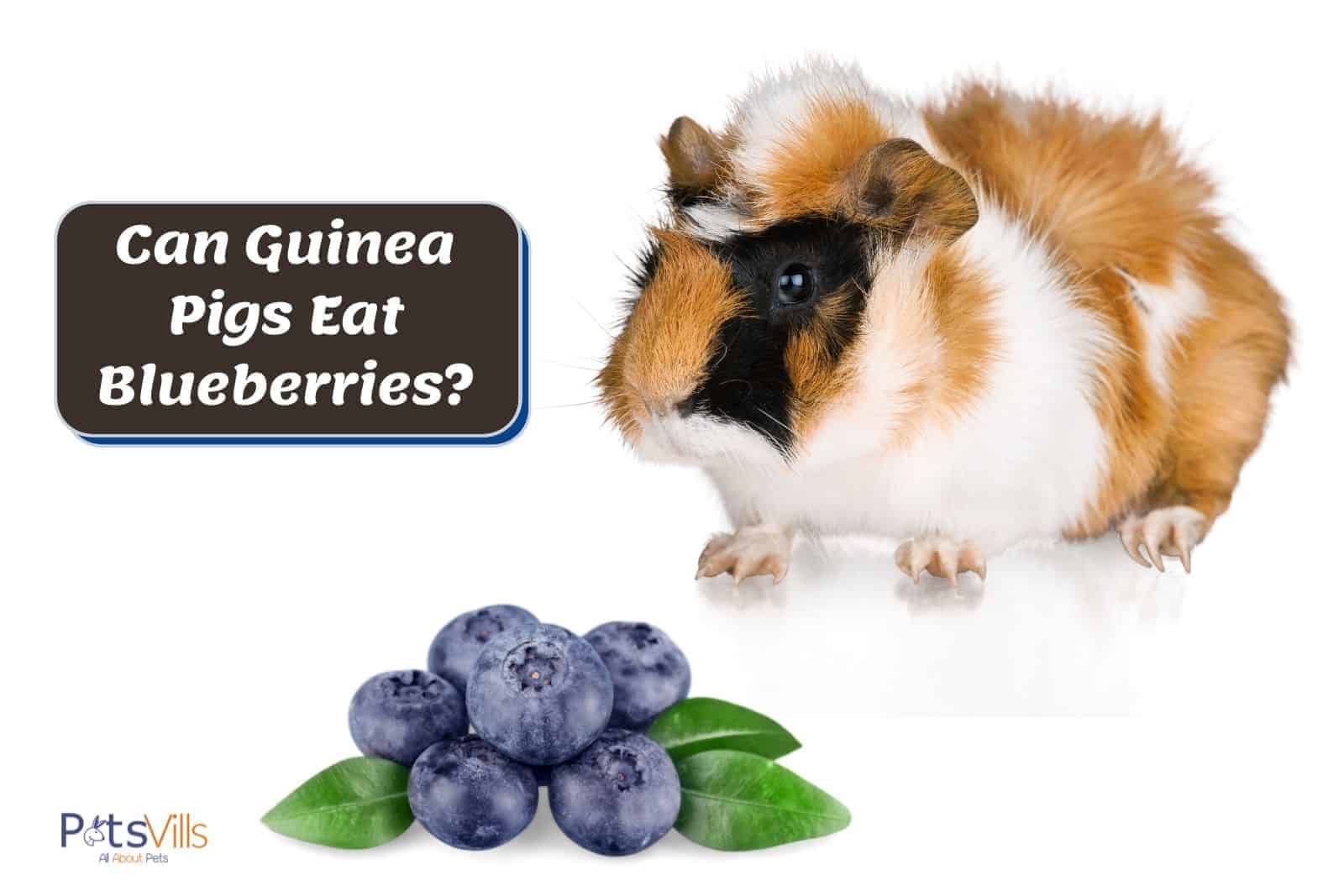Can guinea pigs eat blueberries?
What are their benefits, risks, or alternative fruits for your piggies?
As a guinea pig owner, knowing what your cavy can and can’t eat is vital.
To make it easier for you, I conducted extensive research about blueberries, and below is what I found out.
READ MORE: Can Guinea Pigs Eat Pineapple?
Table of Contents
Can guinea pigs eat blueberries?
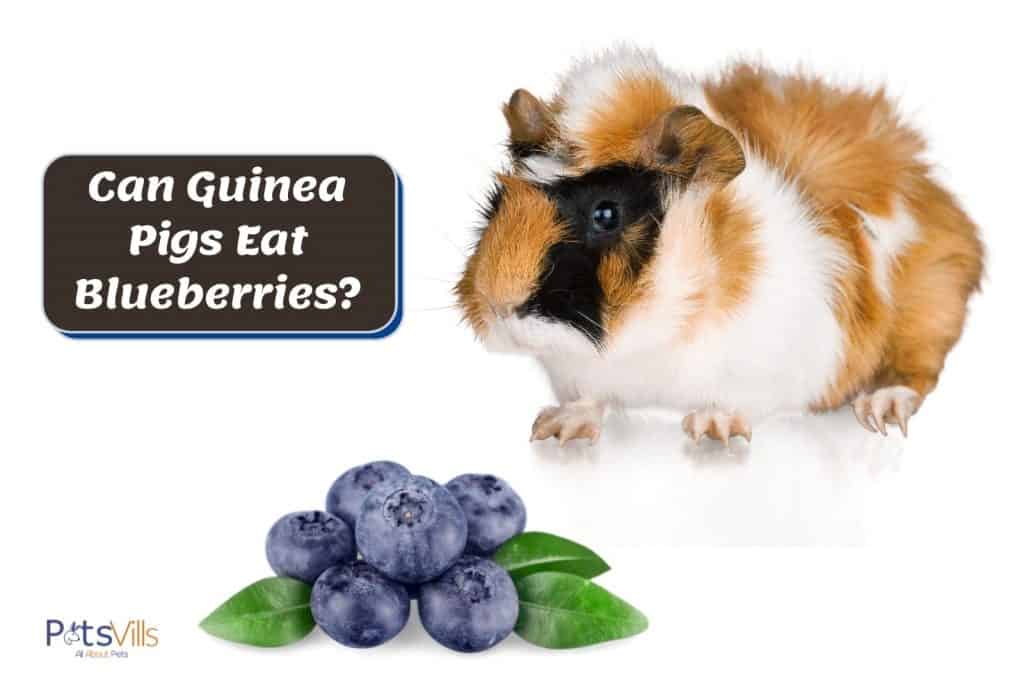
Yes, guinea pigs can eat blueberries. But due to the high sugar content and acidity levels, they are best fed as occasional treats.
Bear in mind that not all guinea pigs can eat these fruits. Some even end up getting mouth sores.
So, start with very small amounts and increase to the recommended amounts once you’re certain your cavies will love them.
Keep reading to find out the appropriate amounts, and the risks of feeding blueberries are also discussed later in the article.
Can guinea pigs eat frozen blueberries?
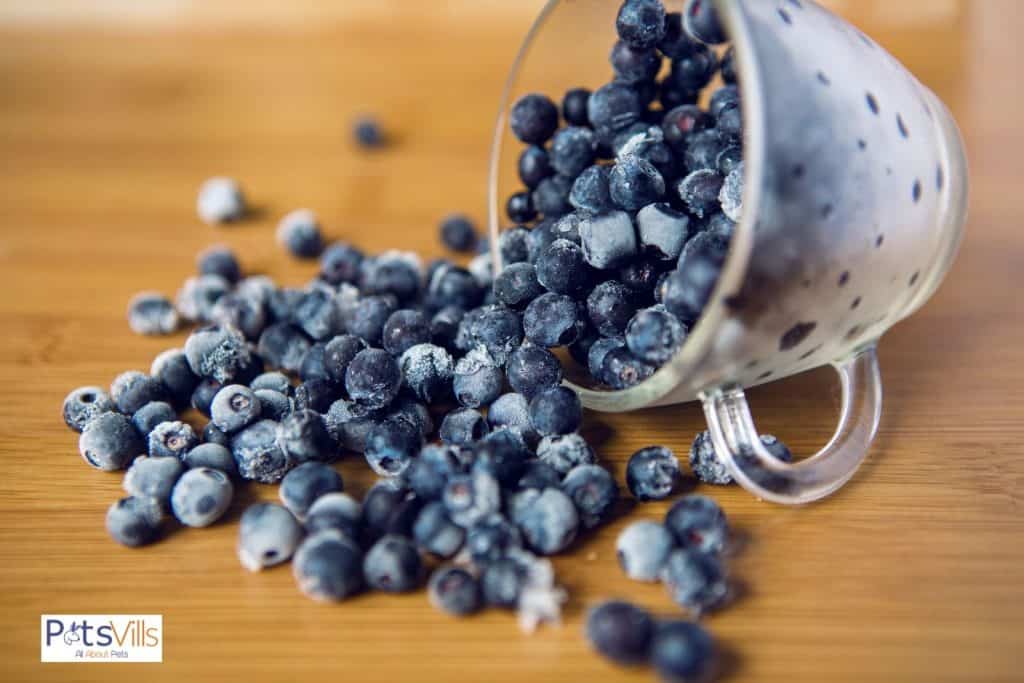
Yes, guinea pigs can eat frozen blueberries. Just make sure you thaw them before feeding them to your little friend.
Frozen blueberries may not always contain the same nutrients as fresh ones.
So if you can, it’s best always to serve them these juicy fruits while fresh.
Can guinea pigs eat dried blueberries?
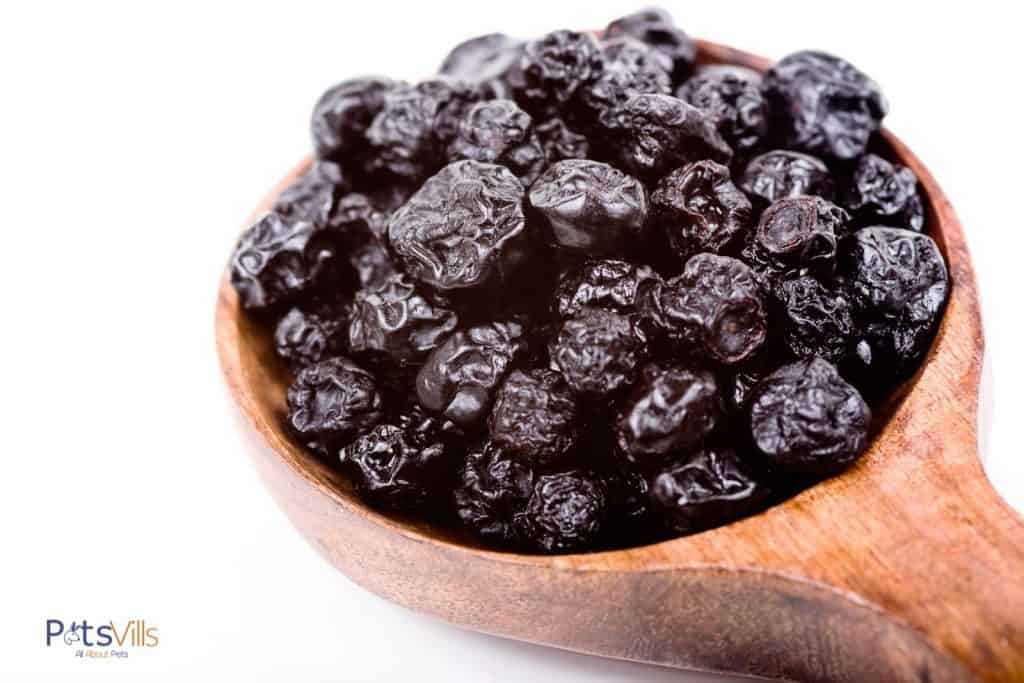
No, guinea pigs shouldn’t eat dried blueberries.
All dried fruit, including dried blueberries, contain excessive sugar content, which isn’t healthy for guinea pigs.
If you have a cup of fresh blueberries and a cup of dried blueberries, the dried blueberries will most likely have up to 6 times more sugar content.
Can guinea pigs eat blueberry leaves?
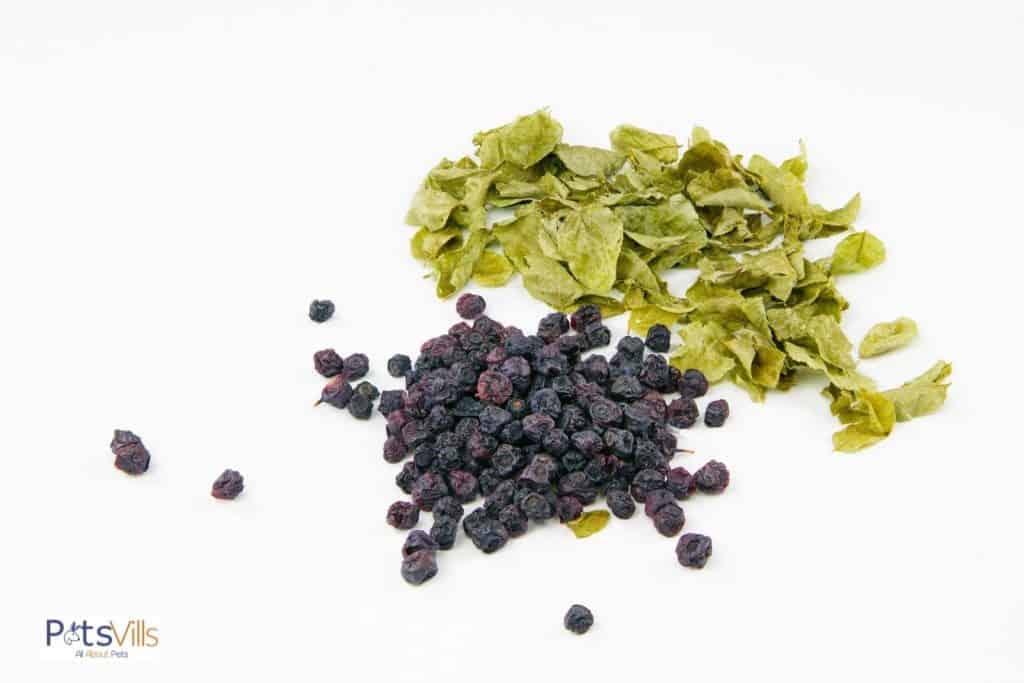
Yes, guinea pigs can eat blueberry leaves. Cavies love leafy vegetables, so they’ll adore blueberry leaves.
Besides, the leaves have a balanced content of sugar, lower calories, and higher antioxidant levels compared to the leaves.
But don’t use these veggies to replace the usual leafy greens such as lettuces.
Instead, mix them up with other types of greens for more health benefits.
Can guinea pigs eat blueberry twigs?
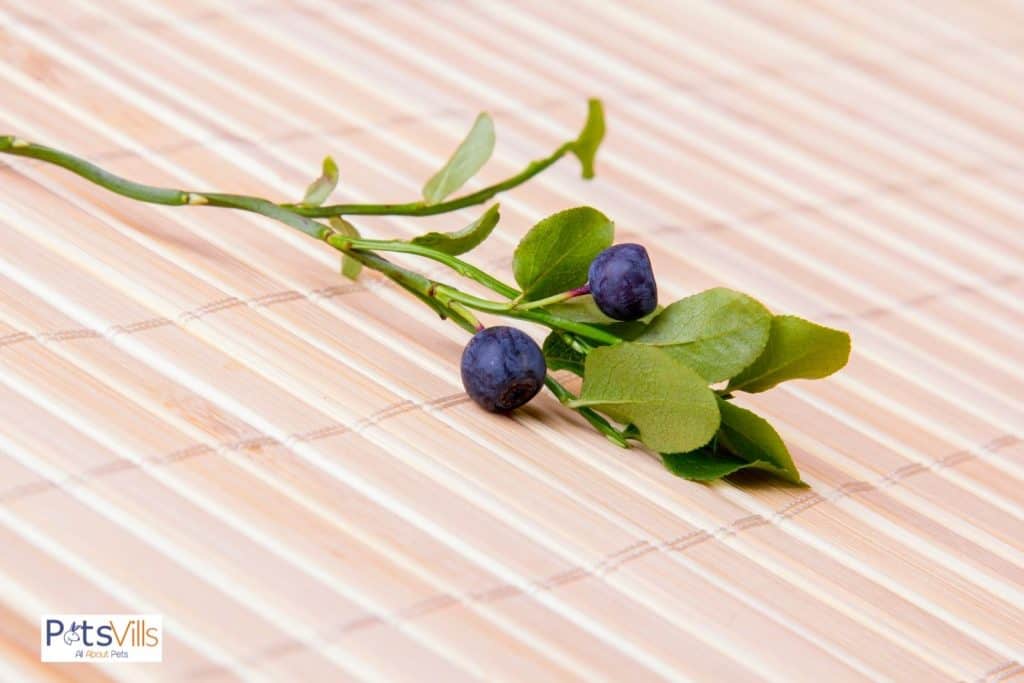
Yes, they can. Guinea pigs eat twigs in the wild, so they can form part of the diet for captivity-bred guinea pigs.
Due to their “hardness” and fibrous nature, they help trim the cavies as they chew on them, which is essential in maintaining good dental health.
Besides being a good treat, twigs are also perfect toys to keep your cavies busy, enlighten their mood, and prevent boredom.
Can guinea pigs eat blueberry muffins?
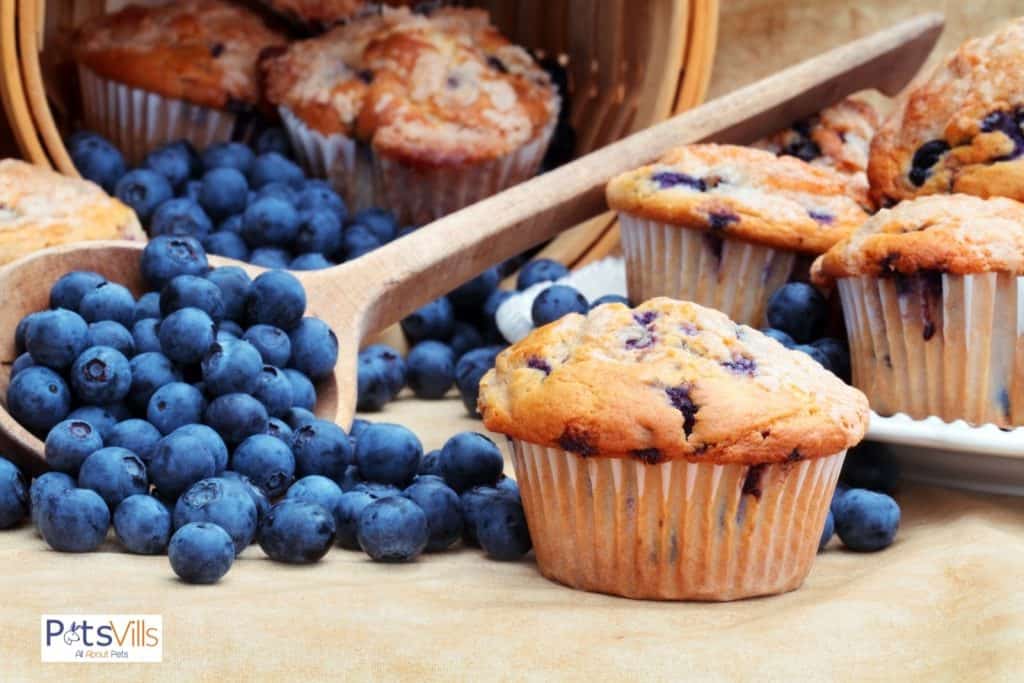
No, guinea pigs can’t eat blueberry muffins.
A muffin is a baked/processed product containing wheat, sugars, salts, and other additives, which may be too complex for the piggy’s digestive system.
Are Blueberries good for guinea pigs? (Nutrients)
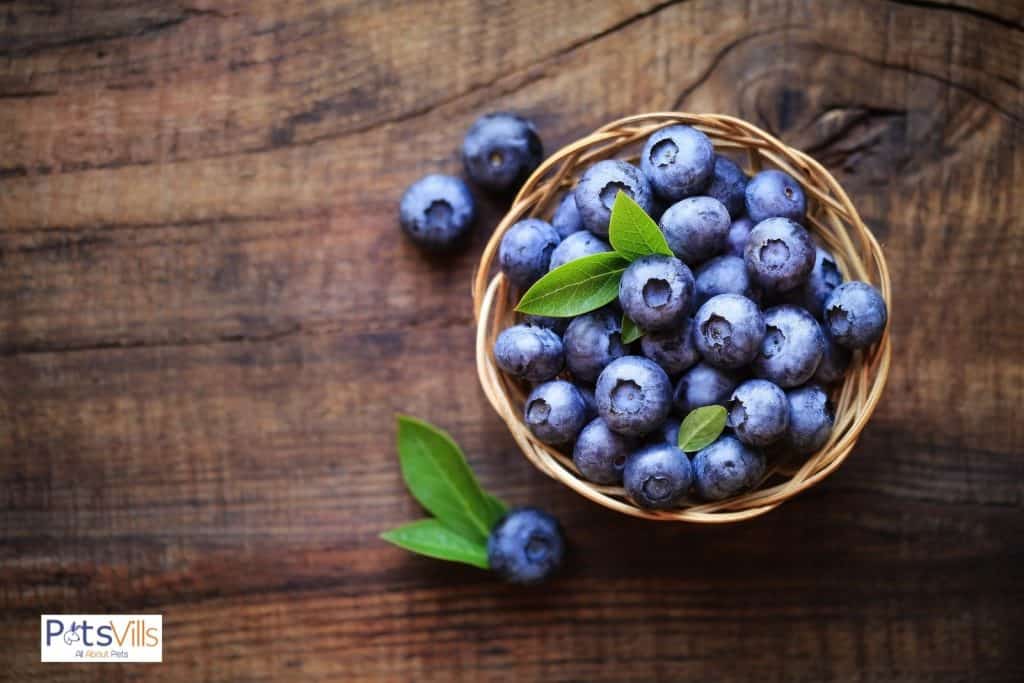
Characterized by blue or purple color and juicy nature, blueberries are some of the sweetest berries.
They are also quite small, with the largest ones growing up to 0.6 inches. And unlike strawberries, they are some of the known true botanical berries.
According to healthline.com, blueberries belong to the heather family and are flowering plants that are also perennial, with chances of recurring after being dormant for some time.
Other berries that are slightly similar to blueberries include bilberries, huckleberries, and cranberries.
Lowbush blueberries and northern highbush blueberries are the most popular varieties. Others include half high, rabbiteye, and southern highbush.
So, are they good for guinea pigs? Yes, they are. They pack a wide range of nutrients, as discussed below.
Vitamin C
Guinea pigs need all the dietary Vitamin C they can get since their bodies can’t synthesize it or store it.
Vitamin C is vital in collagen formation, essential in bone formation, wound healing, and blood vessel integrity.
When there isn’t enough Vitamin C in their bodies, they could suffer from Scurvy, a disease characterized by poor cartilage formation, poor gum health.
While they can get it from hay or fortified guinea pig food, as we will discuss below, it doesn’t hurt to have an extra source of Vitamin C and other nutrients.
Vitamin K1
Blueberries also contain considerable amounts of Vitamin K1, which is essential in bone health and facilitating blood clotting.
Antioxidants
According to WebMD, blueberries contain some of the highest amounts of antioxidants among all fresh fruits.
These are plant compounds that help the body fight diseases, deal with disease-related stress (caused by oxidation), and even deal with free radicals.
Besides Vitamin A and C (which are antioxidants), blueberries also contain anthocyanins, quercetin, and myricetin.
Anthocyanins are the main antioxidants in blueberries, with up to 15 different types.
According to Healthline, anthocyanins are more concentrated on the skin of the blueberries, making it one of the healthiest parts of this fruit.
The higher concentration of these antioxidants on the skin is also responsible for the dark blue or purple color.
Also, anthocyanins are known to prevent heart disease in humans, and they could have the same benefits in guinea pigs.
Quercetin and myricetin are also known to maintain ideal blood pressure, prevent heart disease, diabetes, and cancer.
Calcium
Blueberries contain enough calcium to maintain healthy bones, teeth, and gums, but not too much that it’s fatal.
Too much calcium can lead to bladder stones in guinea pigs, especially when there’s a higher amount of oxalates from other food.
It can also inhibit the absorption of more calcium into their bodies.
Manganese
A study published by the National Centre of Biotechnological Information states that guinea pigs need trace minerals such as Manganese, Iron, copper, iodine, and zinc in their diet.
According to this report, guinea pigs need at least 40mg/kg of manganese which helps in growth and facilitates the metabolism of amino acids, protein, carbohydrates, and lipids.
Carbs
Blueberries contain two forms of carbs, sugars (glucose and fructose) and fibers. According to healthline.com, the sugars score a 53 GI (Glycemic Index).
While this may not be harmful to humans, it’s too much sugar content for guinea pigs, and it could cause some health issues, as I’m going to discuss later.
On the other hand, fiber is essential in facilitating the digestion of different foods and facilitating overall growth in guinea pigs.
Too much fiber may cause constipation, but only 16% of the total carb content in blueberries is fiber. This can’t amount to harmful levels.
Calories and fats
Blueberries contain insignificant amounts of proteins, fats, and calories, making them a healthier snack than most fruits.
Summary of Blueberries Nutrition Facts
Below is a summary of all the nutrients blueberries contain, courtesy of the USDA National Nutrient Database.
| Nutrients | Amount in 100g |
| Water | 84.2 g |
| Vitamin C | 9.7 mg |
| Vitamin A | 54 IU |
| Vitamin K | 19 ug |
| Calcium | 6 mg |
| Magnesium | 6 mg |
| Phosphorous | 12 mg |
| Potassium | 77 Mg |
| Dietary Fiber | 2.4 g |
| Sugars | 9.96 g |
| Protein | 0.74 g |
| Carbohydrates | 14.5 g |
| Calories | 57 Kcal |
Risks to consider when feeding your guinea pig blueberries
All the nutrients I have reviewed make blueberries a nutritious and tasty treat.
However, as mentioned earlier, there are risks to feeding your pet these fruits. Let’s discuss them in detail below.
High Acidity levels
Blueberries contain higher acidity levels compared to other fruits. This acidity is likely to cause mouth sores in some guinea pigs more than others.
So, if your guinea pigs get mouth sores from acidity or any other cause, blueberries aren’t the best frit for them.
Too much sugar content
Guinea pigs enjoy sugary stuff, especially fruits.
However, you should keep the sugar content to minimal amounts since you could cause stomach upsets, stomach pain, discomfort, diarrhea, and other digestive issues if you overfeed them.
Obesity
Just like in humans, foods with high sugar content can lead to gaining rapid weight.
It can get worse in guinea pigs since they are most of the time sedentary, with minimal physical activity.
Obesity and sugar content also exposes guinea pigs to further health issues such as diabetes and heart issues.
How often can you feed guinea pigs blueberries?

You should feed your guinea pigs about two blueberries up to two times per week. As tempting as it may be, don’t exceed this amount to avoid the risks I just mentioned.
As I mentioned earlier, guinea pigs will react to blueberries differently. So, start with one and observe how your pet’s body reacts.
If there’s pain or discomfort, avoid these fruits entirely (I will discuss alternatives in a minute).
Preparing blueberries for guinea pigs
- Collect ripe blueberries that don’t have any marks, are rotten, or are unripe. Ripe berries are the safest, while the rest could cause further digestive issues in guinea pigs.
- Wash the blueberries with a lot of water and rinse them.
- You can feed them the fresh blueberry while whole. But if it’s too large, cut it into smaller pieces using a clean knife.
- You can let the guinea pigs feed from your hand if you’re trying to bond with them, but feeding from a clean bowl is always the best idea.
- While blueberries are nutritious on their own, it’s always helpful to mix a variety of fruits.
- If you’re not sure if your piggies will love the blueberries or they’re suffering from a health issue, consult a veterinarian before introducing blueberries or any other fruits.
Fun Tip – Due to their small size, blueberries are the perfect treats for playing a food scrabble or maze-building game.
For food scrabble, place the fruits in a hollow object or box and observe them as they try to get the food out of the object.
For maze building, erect cardboards and build a maze, placing the treat at various sections of the maze.
Guinea pigs will enjoy working hard to find the treats in both games.
Alternative fruits to blueberries for guinea pigs
Fruits make a good addition to a guinea pig’s diet since they are a suitable source of Vitamin C.
While blueberries contain some of the highest amounts of antioxidants, there are many other alternatives to choose from, especially when you want to mix different types of fruits.
Below are the best fruits guinea pigs can eat, and also fruits to avoid.
Other Berries
The botanical definition of berries is different from what most people know. Not all fruits that end with the word “berry” are berries, but we still refer to them as berries.
For instance, strawberries, blackberries, or cranberries aren’t actually berries, but blueberries and watermelons are.
All in all, all kinds of berries (those with the word berry in them) are most of the guinea pig foods that are safe.
But due to the sugar content, keep the amounts to 1 to 2 fruits per week.
Besides the fruits, guinea pigs will also enjoy the leafy par, stems, and twigs of the berries. We have covered all about blueberries in this post.
For strawberries, check out this post, Can guinea pigs eat strawberries?
Citrus fruits
Citrus fruits such as oranges, grapefruits, tangerines, and clementines are some of the best sources of Vitamin C among all fruits.
However, they are highly acidic and may cause mouth ulcers in guinea pigs. I recommend just 1 to 2 pieces of oranges at least twice a week.
Avoid feeding your piggies orange fruit seeds since they may choke on them. But the peels are safe, and an additional source of Vitamin C.
Just make sure you wash them thoroughly to get rid of pesticide residuals and dirt.
Apples
Apples are some of the most popular and readily available fruits worldwide.
Since humans enjoy them so much, they are always finding ways to feed them to their pets.
Apples contain considerable amounts of fiber, Vitamin C, Vitamin A, potassium, and Vitamin K.
Like in all other fruits, moderation is key.
Just cut the fruit into small cubes and give your guinea pig one or two pieces, and have a few pieces yourself as a way to bond with your little friend.
Related: Can Guinea Pigs Eat Apple Cores?
Peaches
Peaches are another excellent fruit for guinea pigs.
Packed with fibers, Vitamins, and antioxidants, they have some nutritional value, though not that much compared to blueberries and oranges.
But guinea pigs often enjoy them for their sweetness. You can include peaches, among other treats.
One slice every two weeks would do, and make sure when you feed them peaches, the other treats should have a considerably lower sugar content to avoid a sugar spike.
Melons
Guinea pigs love most types of melons, especially watermelons, cantaloupe, honeydew melons, and casaba melons.
They are the perfect fruits for when it’s too hot, and you need to keep your guinea pigs hydrated.
Melon varieties such as cantaloupes don’t have as much sugar content as oranges and blueberries, making them a safer treat.
Guinea pigs can eat the watermelon and honeydew melon rinds but avoid feeding them the seeds since they’re a choking hazard.
On the other hand, cantaloupe rinds are too rough and hard challenging for the guinea pig’s digestive system to handle, so avoid them entirely.
Pears
Pears are a perfect alternative to blueberries since they have some Vitamin C, Fiber, Vitamin A, Vitamin K, Calcium, and phosphorous.
However, they contain too much sugar content, which exposes your guinea pigs to obesity and other health problems.
They are also quite acidic, making them unsuitable to guinea pigs prone to mouth sores.
Bananas
A banana is another great fruit to offer your piggy as a treat. The sugar content is on the higher side, so only provide a few pieces a month.
Besides being sweet, bananas are also high in fiber, Vitamins, water, and antioxidants.
The peelings are also an additional source of fiber, but not all guinea pigs will love the peel, so you can try and see if your pet enjoys them.
Kiwi
Kiwi fruits are rich in Vitamin C, K, B6, E, calcium, phosphorous, fiber, and many other nutrients, making it one of the most nutritious fruits to include in the fruit mixture.
But like with all the other fruits, stick to only a few slices to prevent feeding your pet too much sugar.
Kiwis also contain a considerably high amount of calcium which could lead to bladder stones.
Other fruits to feed guinea pigs
- Papaya
- Apricots
- Pumpkin
- Cherries
- Plums
FrUits guinea pigs can’t eat
Below are some fruits that will cause more harm than good to your cavies.
Avocado
This green fleshy fruit may seem like a perfect treat. After all, it’s not as sugary as apples.
However, the fleshy inner part contains too much fat, leading to obesity and other digestive issues.
The pit, skin, and other parts of the avocado plant also contain a toxin known as persin, which is poisonous to most small pets, including guinea pigs.
While there are success stories about guinea pig owners safely feeding their pets avocados, it’s best to avoid them entirely.
Chilli Peppers
Chili or hot peppers, also known as jalapenos, are not safe for guinea pigs.
Due to the acidity levels, they can cause severe damage to the guinea pigs’ digestive system.
Some health issues associated with chili peppers include stomach upsets, discomfort, and pain.
The only type of pepper safe for cavies and can be fed occasionally are bell peppers.
What should guinea pigs eat?
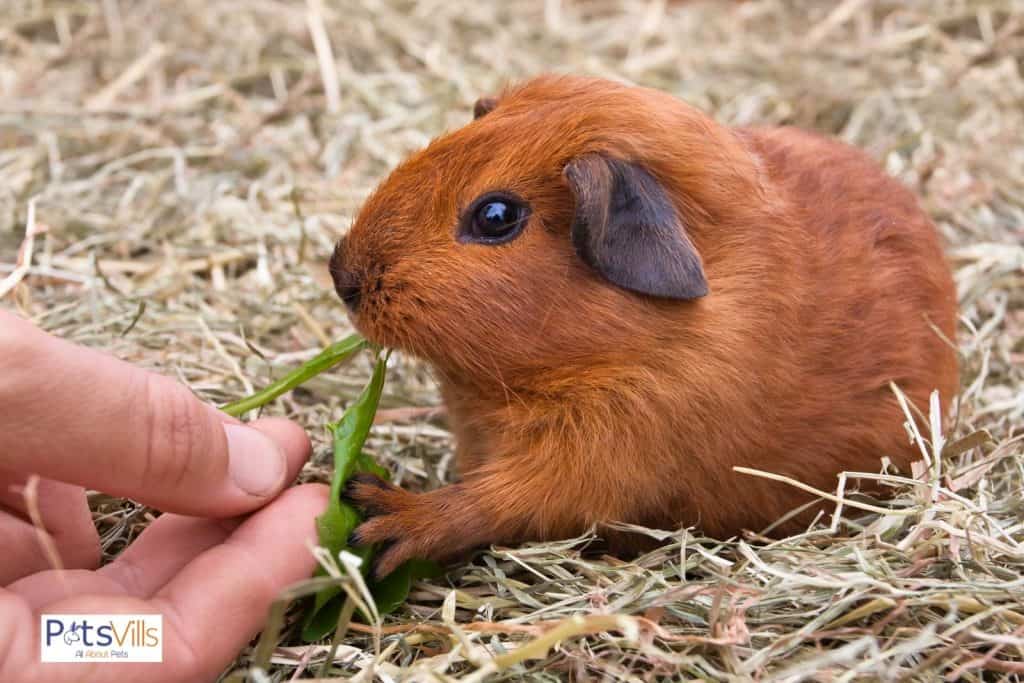
While fruits have some nutrients that guinea pigs need, they can’t form 100% of their diet. They are best served as treats.
Below are the main types of foods guinea pigs should eat.
- Hay/grass
- At least 70% of a guinea pig’s diet should contain hay or grass. This is the type of food that contains all the nutrients they need in balanced amounts.
- Guinea pigs can feed on hay 24/7 without being exposed to any health issues, as long as the hay was prepared safely.
- Besides providing nutrients, hay is also fibrous, which helps trim and clean guinea pigs’ teeth.
- Timothy hay is the best variety, but you can mix it up with oat hay and orchard hay.
- Alfalfa hay is not a good option since it contains too much calcium and phosphorous, which may cause digestive issues for guinea pigs.
- Pellets/Commercial food
- Pellets can amount to at least 15 to 20% of all guinea pig food. This type of food comes in handy when your cavies can’t get all the nutrients they need from hay, especially Vitamin C.
- Make sure the pellets are specifically made for guinea pigs. And make sure they don’t have seeds, dried fruit, corn, or nuts.
- Vegetables and fruits
- Vegetables and fruits are an additional source of nutrients. Still, they contain too much water, and if fed in excess, they may lead to severe health problems such as bladder stones, Scurvy (they lack adequate Vitamin C), and digestive issues.
- A cup of a mixture of fruits and vegetables per day is enough for guinea pigs. Some of the best vegetables to offer include green leaf lettuces, red leaf lettuces, romaine lettuces, strawberry tops, spinach, kale, and parsley. This post also contains all the fruits safe for your guinea pigs.
- Water
- To keep them hydrated and facilitate digestion, ensure there’s a consistent supply of fresh water in the guinea pig’s cage.
- If they didn’t finish the water you placed yesterday, replace that with fresh water to prevent bacteria growth.
FAQs
Can guinea pigs eat blueberries and strawberries?
Yes. Both blueberries and strawberries are safe and nutritious for guinea pigs. They are additional sources of vitamins, fiber, and antioxidants. However, you should offer them in moderation due to the high sugar content and acidity levels. It’s also best to mix them with other fruit types and veggies.
What foods can kill guinea pigs?
Processed foods such as bread, biscuits, chocolate, candy, and potato chips are not safe for guinea pigs. Meat and dairy products are also not suited for their digestive systems. Guinea pigs are herbivores, so all their foods should be based on fresh plants. The only exception is fortified food specifically made for them.
Can guinea pigs eat blueberry jam?
No, they shouldn’t. All fruit-based jams contain too much sugar and other preservatives that are too complex for your piggies to digest. Always feed your cavies fresh fruits.
Conclusion
And that’s everything you need to know about can guinea pigs have blueberries? They contain some of the highest amounts of antioxidants which help fight diseases, maintain ideal blood pressure, heart rates, and provide extra Vitamin C for your guinea pigs.
But when you feed them too much, you put them at risk of being obese, diabetic, and developing mouth sores. A good guinea pig diet should mainly consist of hay, pellets, with fruits and veggies forming at least 5% of the total diet.
References:
- “Berry | Definition, Types, & Examples.” n.d. Encyclopedia Britannica. Accessed June 3, 2021. https://www.britannica.com/science/berry-plant-reproductive-body#:~:text=Any%20small%20fleshy%20fruit%20is.
- Davis, Jeanie Lerche. n.d. “Antioxidants in Fruits.” WebMD. Accessed June 3, 2021. https://www.webmd.com/diet/features/antioxidants-in-fruits#1.
- “FoodData Central.” n.d. Fdc.nal.usda.gov. https://fdc.nal.usda.gov/fdc-app.html#/food-details/171711/nutrients.
- “Guinea Pig Feeding.” 2018. The Humane Society of the United States. 2018. https://www.humanesociety.org/resources/guinea-pig-feeding.
- Hrefna Palsdottir, MS. 2019. “Blueberries 101: Nutrition Facts and Health Benefits.” Healthline. Healthline Media. February 20, 2019. https://www.healthline.com/nutrition/foods/blueberries#what-they-are.
- “Welcome to Sawnee Animal Clinic.” n.d. Sawneeanimalclinic.com. Accessed June 3, 2021. https://sawneeanimalclinic.com.
- “What Should I Feed My Guinea Pigs? – RSPCA Knowledgebase.” 2018. Rspca.org.au. November 9, 2018. https://kb.rspca.org.au/knowledge-base/what-should-i-feed-my-guinea-pigs/.
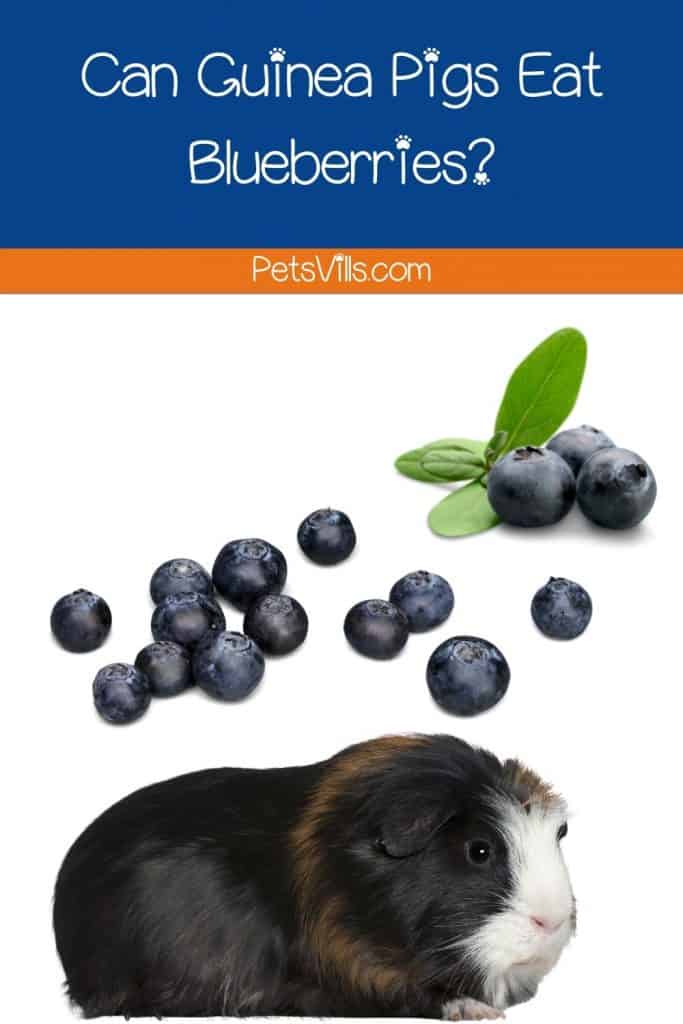
Do you feed your guinea pigs blueberries? Can you share your experience with us?
Barry Stingmore is a British content writer living in Fuerteventura, Spain. An animal lover at heart, he shares his home with a dog and four rescue cats and has a passion for writing about animals big and small.
Barry loves finding answers to your animal-related questions, the more research involved the better! You can rely on him to find the facts.
Find him on FACEBOOK, TWITTER AND Linkedin
Read his latest ARTICLES.
Find more about him HERE.

